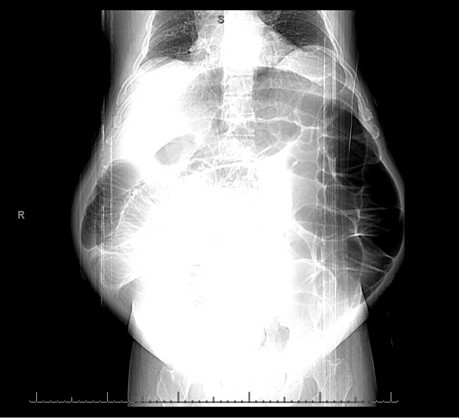Case Presentation: 67 year old caucasian male with history of right sided hemicolectomy, schizoaffective disorder on clozapine presented with severe epigastric abdominal pain and nausea for 4 hours. He was hemodynamically stable on presentation and physical exam revealed distended abdomen with diffuse tenderness. Initial blood work including CBC, CMP, TSH, lactate was within normal limits. CT abdomen revealed markedly air and fluid distended stomach, loops of small bowel and colon. The presumptive diagnosis of adynamic ileus was made and patient was kept nothing per mouth. Nasogastric tube was placed on low intermittent suction. He was initiated on IV fluids and supportive care. Patients abdominal distension and pain worsened, in few hours patient became restless, hypotensive with BP 84/62mmHg. He developed more tachypnea and tachycardia, VBG showed metabolic acidosis. Cefazolin and metronidazole was initiated to cover sepsis secondary to translocation of bacteria from GI tract. General surgery recommended colonic decompression/ laparotomy and transfer to tertiary center. Unfortunately, he had PEA arrest, resuscitation was achieved and transferred to higher center intubated and ventilated. Exploratory laparotomy at tertiary center revealed massively dilated small bowel, ileocolic anastomosis intact, no necrosis found. Patient remained unresponsive after surgery and EEG revealed status myoclonus. Neurology suggested the possibility of patient remaining comatose. Patient had an advance directive stating discontinuation of care in a vegetative state, hence POA and ethical committee was contacted and he was changed to CMO status.
Discussion: Colonic pseudo obstruction or Ogilvie syndrome is characterized by acute dilatation of colon, in absence of anatomical lesion that obstructs the flow of intestinal contents. Antipsychotics including clozapine is a known etiology. We suspect our patient had abdominal compartment phenomenon from Ogilvie syndrome. This lead to multiorgan dysfunction and subsequent PEA arrest. The CT Abdomen or laparotomy did not reveal any obstruction and clozapine was a recent medication for the patient, reinforcing the possibility of pseudo-obstruction.
Conclusions: As of January 2020, FDA has strengthened the warning that untreated constipation with Clozapine can lead to serious bowel problems. This case teaches us to be cautious prior to initiating clozapine in patients with prior bowel surgery or chronic constipation

